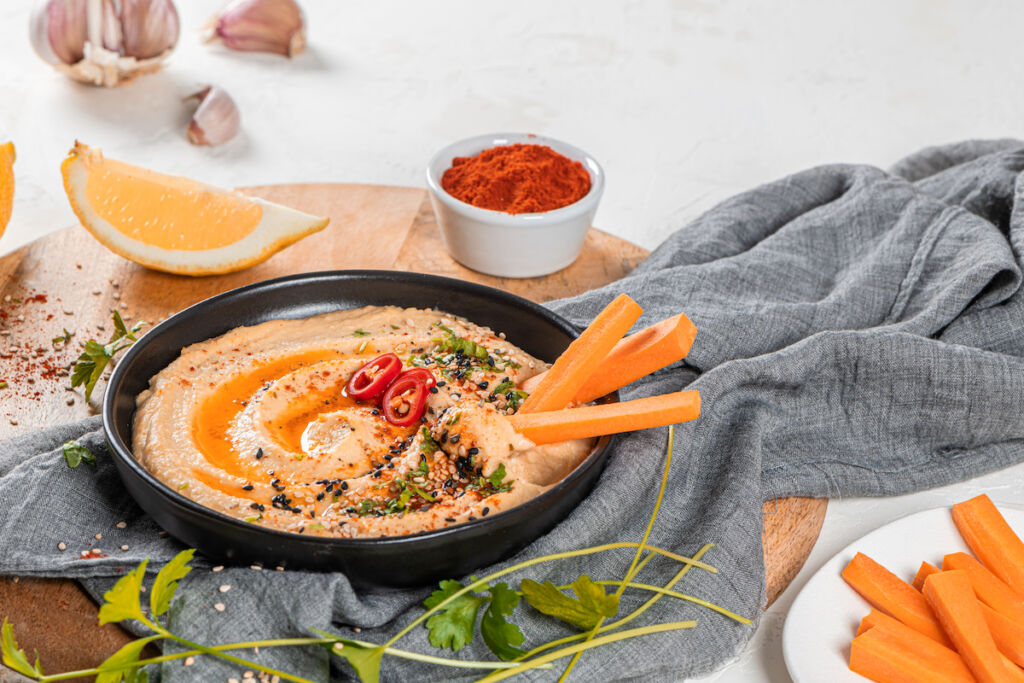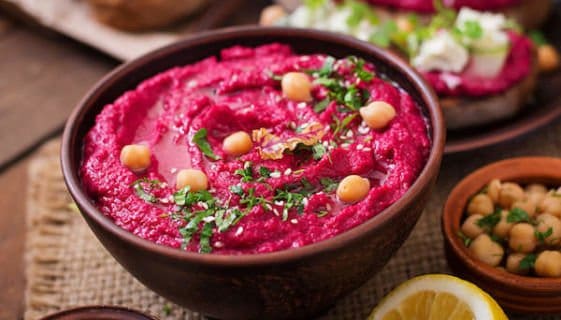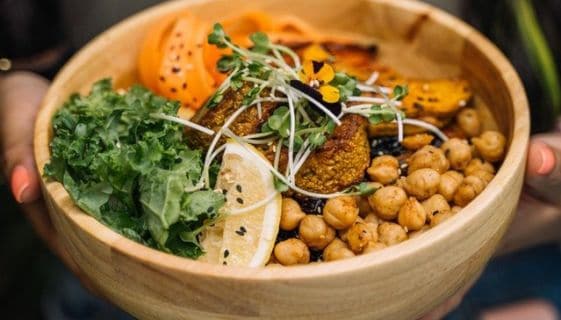We are excited to share our bright and delicious roasted spring carrot hummus—a perfect dip for this season’s healthful snacking. This roasted, protein-packed spiced carrot hummus is a fun and tasty twist on the classic version. The combination of vibrant spices and roasted carrots provides a sweet and smoky flavor that compliments the blissfully creamy texture and increases the immune-boosting, anticancer properties. This recipe is simple to make, vegan, and gluten-free. It is also very versatile--spread it, dip it, or dollop it to add a punch of extra flavor to any sandwich, wrap, salad, or snack platter.
Roasted Spring Carrot Hummus
Ingredients
Roasted Carrots
- 4-5 spring carrots (1 inch wide and 3-4 inches long) cut into 1-inch pieces
- 1/2 tsp cumin
- 1 tsp coriander
- 1 tsp paprika
- ½ tsp salt and pepper
- High-heat oil (avocado, coconut, sunflower)
Hummus
- Roasted carrots
- 1 15 oz can white beans
- 1 large lemon, zested and juiced
- 2-3 large garlic cloves
- 2 Tbsp peanut or almond butter
- ¼ cup olive oil
- Salt and black pepper to taste
Garnish: fresh herbs (basil, cilantro, or parsley), chilis, a drizzle of olive oil, seeds or nuts, olives
Serve with: pita chips, crackers, and cut veggies.
Instructions
- Roast carrots: Preheat oven to 425 degrees. Place carrots on a baking sheet. Drizzle with oil, salt, pepper, and spices.
- Roast for 15-20 minutes until carrots are tender and begin to caramelize, tossing them halfway through the cooking process.
- Remove from the oven and allow to cool for 10 minutes.
- Once carrots are cooled, place them in your food processor or high-powered blender and blend until only small bits remain.
- Add beans, lemon juice, zest, and peanut or almond butter and blend until smooth.
- Drizzle in olive oil as the hummus is mixing.
- Taste and adjust seasoning as needed. If it is too thick, add a bit of water, starting with 1 teaspoon at a time.
- It will keep it in the fridge for up to a week.
Nutrition
Carrots: Packed full of Beta-carotene (precursor to vitamin A). Vitamin A is integral for vision and immune function, as well as skin and bone health. Beta-carotene is a powerful antioxidant that can reduce inflammation and boost immune function by increasing disease-fighting cells and assisting cells in protection against viruses. Scientists have also reported that carotenoid-rich foods (orange foods) can help reduce the risk of heart disease and cancer (especially in the lungs, esophagus, and stomach), and can improve immune system function. Carrots are also an excellent source of vitamin C, an antioxidant that helps destroy free radicals and support the body’s natural immune response by reducing oxidative stress.
Cumin: Good source of iron. Aids in digestion. Cumin is antioxidant and anti-inflammatory,
Coriander: The seed of cilantro. Fragrant and flavorful. Anti-microbial and anti-inflammatory properties.
Paprika: Packed full of vitamin A along with lutein and zeaxanthin to support eye health. It also has a variety of antioxidants with anticancer effects (by fighting cell damage). Paprika can increase our “good” cholesterol (HDL) and reduce our “bad” cholesterol (LDL), decreasing the risk of heart disease and stroke.
Beans: Areas around the world that have been identified as places where humans live the longest (Blue Zones) are where chickpeas are commonly found in the diet. These versatile and affordable beans contain folate, fiber, iron, phosphorus, and healthy fats. Their high amounts of soluble fiber and plant sterol support a healthy gut microbiome. Beans increase feelings of satiety and have been associated with a decreased risk of heart disease.
Citrus juice and zest: Packed full of a multitude of nutrients such as vitamin C, flavonoids, and fiber, which aid in vascular protection, reduce inflammation, improved gastrointestinal function and health, and can play a role in preventing diabetes, cancer, and neurological disease.
Garlic: Considered prebiotics, meaning they feed the “good” bacteria in our gut and promote a healthy digestive system. Research supports that compounds in onions, such as allicin, have antioxidant, anti-inflammatory, antimicrobial, and cardioprotective properties.
Olive Oil: Heart-healthy fat that can increase good cholesterol and reduce triglyceride levels. Packed full of antioxidants to support eye health and anti-inflammatory properties shown to help reduce symptoms of arthritis.



 Ananda Kaplan
Ananda Kaplan


